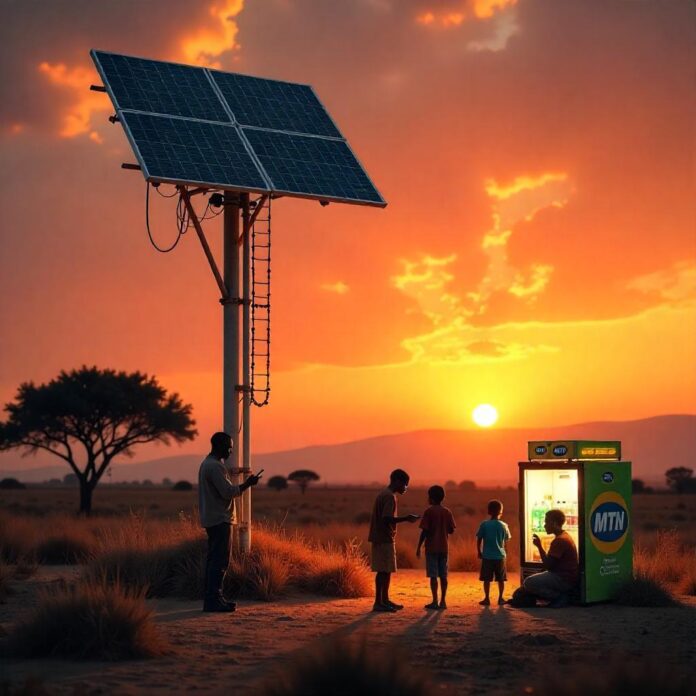The Solar-Powered Signal Revolution
Nigeria’s telecom sector—the backbone connecting 172.95 million subscribers—is trapped in a diesel dependency crisis. Every month, 34,862 telecom towers devour 40 million liters of diesel, bleeding operators dry to the tune of $350 million (₦534.16 billion) annually. Why? A broken national grid delivers less than 5,000 MW against a 200,000 MW national demand, forcing towers into generator slavery. But now, the Nigerian Communications Commission is flipping the script. Partnering with the Rural Electrification Agency, they’re harnessing Nigeria’s bountiful solar potential to slash costs by 20–50%, cut carbon emissions, and connect off-grid communities. This isn’t just about cleaner energy—it’s about cheaper data, fewer dropped calls, and digital liberation for millions. Let’s explore how this renewable revolution will transform your daily connectivity, your wallet, and your role in a greener Nigeria.
The Diesel Dilemma: Why Telecoms Can’t Afford the Status Quo
The Crippling Cost of Always-On Connectivity
Imagine your mobile network as a ravenous diesel beast. Diesel alone eats 35% of operators’ operating expenses—funds that could expand rural coverage to 40+ million unconnected Nigerians. Every dropped call during your Zoom meeting? Blame generator failures causing network uptime to plunge to 85% versus solar’s 99.95%. As internet usage exploded by 685.69% since 2019, energy hunger grew. Africa’s networks already use 0.24 kWh per GB—40% more than the global average due to inefficiency.
The Hidden Tax on Your Digital Life
Diesel costs don’t vanish—they’re passed to you. Regulatory bodies recently approved a 40% tariff hike after operators suffered massive losses. Worse, dirty energy spews 49+ million tons of CO₂ yearly across Sub-Saharan Africa—equivalent to 10 million cars. When rural clinics lose service during blackouts, diesel isn’t just costly—it’s lethal.
The NCC’s Solar Blueprint: Strategy, Stakeholders & Targets
Policy Engine: The Power Pact
A joint committee launched to smash silos between energy and telecom planning. Their mission? Deploy solar-hybrid systems at tower sites using geospatial data sharing to pinpoint ideal solar sites using sun-exposure maps, blended financing merging public funds and international loans, and socio-economic tracking to measure rural job creation and school connectivity. Leadership declared this partnership drives inclusion, bridges inequalities, and creates shared prosperity. Translation: Solar towers enable e-learning in Bauchi villages and telehealth in Niger State.
Industry Trailblazers
Major operators renegotiated tower contracts prioritizing solar-gas hybrids. Result: hundreds of billions saved—money now funding thousands of solar sites. Competitors pilot lithium battery plus solar combos to axe diesel use by 60%. Their ambition includes eco-conscious branding for environmentally aware users.
| Metric | Current Status | 2030 Target | Key Catalysts |
|---|---|---|---|
| Renewable Tower Penetration | Less than 10% of sites | 50% of sites | Regulatory frameworks |
| Operating Cost Reduction | Not available | 20–50% savings | Solar microgrids |
| CO₂ Emissions | 49M+ tons/year | 30% reduction | Hybrid systems |
| Rural Coverage Gap | 40M unconnected | 60% closed | Off-grid solar towers |
Solar in Action: Real-World Wins Fueling Your Connectivity
Hybrid Towers Slashing Urban Costs
Solar-diesel sites in major cities cut generator runtime by 70%. For you, that means fewer network busy alerts during rush hour. Bonus: Solar panels can’t be siphoned like diesel—reducing theft losses that inflate your bills.
Off-Grid Towers Lighting Up Lives
In remote communities, 100% solar towers power evening classes and refrigerated medicine storage. Farmers now check crop prices via mobile apps without traveling kilometers to make calls.
Global Inspiration
Nigeria mirrors international success stories where tax breaks and accelerated depreciation for solar equipment boosted adoption. Lesson? Policy incentives attract private investment—saving consumers billions.
Roadblocks & Solutions: Making Solar Work for Nigeria
Security & Storage Hurdles
Solar panels and batteries are theft magnets—especially in remote areas. Fix: Community co-ops programs pay locals to protect infrastructure, creating jobs. Lithium-ion batteries also degrade fast in high heat. Next-gen fix: Hydrogen fuel cells pilot-tested for night backup.
Policy Gaps Needing Urgent Fixes
High import duties on solar equipment versus international models require adjustment. Billions are needed for transmission lines to support solar-diesel hybrids nationwide.
Your Life on a Solar-Powered Network: Cheaper, Cleaner, Smarter
Pocketbook Benefits: Lower Bills, Fewer Outages
Every 10% drop in operator costs could cut data prices by 3–5%. Solar’s steady energy also means your video streams won’t buffer during storms.
Eco-Smart Digital Habits
Support brands with green energy initiatives. Your calls then emit near-zero emissions. Join community solar co-ops to co-own tower energy. Excess power can run your appliances.
The Ripple Effect: Health, Education, Commerce
Solar towers enable more than calls. Traders use tower-powered Wi-Fi so kids study after dark while solar-chilled fridges double cold-drink sales.
Five Steps to a Full Renewable Shift
Scale Pilots Nationwide: Target solar sites using international templates.
Unlock Green Cash: Tap renewable funds and carbon credits.
Fortify Security: Technology-tracked panels and drones to deter thieves.
Eco-Labeling: Demand SIM packs labeled with solar percentage—voting with your currency.
Policy Sync: Align targets with national energy transition plans for tax breaks.
Dial Into the Solar Age
Nigeria’s renewable telecom shift isn’t about tech—it’s about empowerment. Solar slashes the diesel tax strangling networks, directly lowering your data costs. It beams Wi-Fi to schools clinics, and turns everyday Nigerians into clean energy producers. Leadership confirms this drives inclusion and shared prosperity. Your move? Switch to a solar-backed network. Demand tower security in your community. Explore solar co-ops. Together, we’ll transform towers from diesel guzzlers into beacons of progress.


